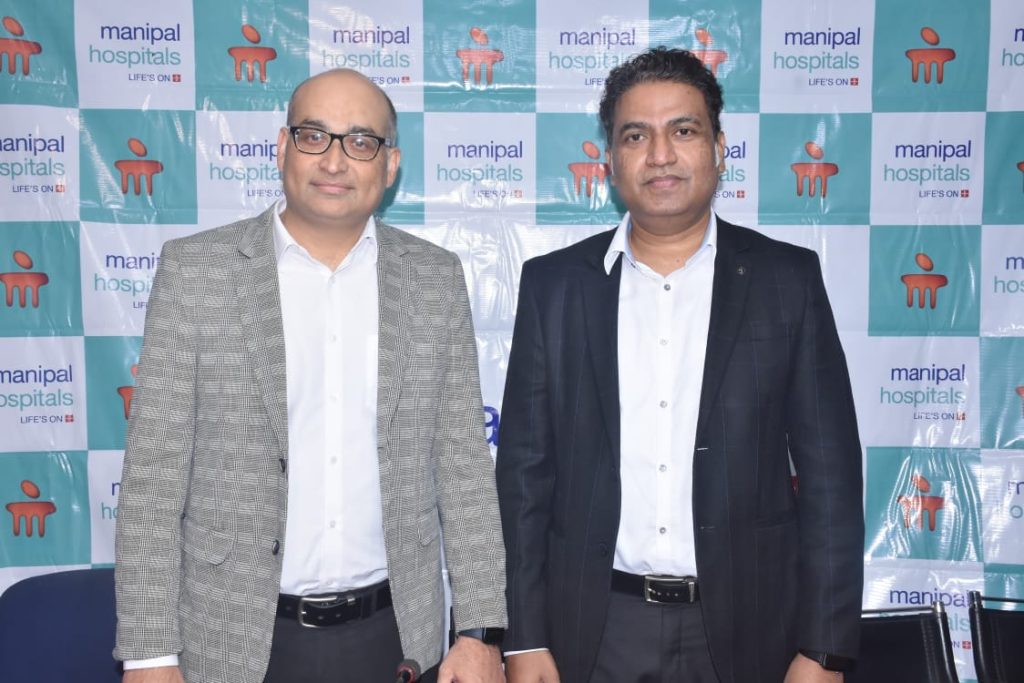✍️By Special Correspondent
Multiple myeloma is a type of blood cancer that arises from plasma cells, accounting for 10–15% of blood cancers. At present, the incidence of this type of cancer in India is about 1in 100,000 cases, but recent statistics indicate a probability of an increase in cases in metropolitan cities. March is observed as the Multiple Myeloma Awareness Month. On this note, Manipal Hospital organized a press conference today to create widespread awareness of the disease among the general public. Dr. Mallikarjun Kalashetty, Consultant – Haematology, Haemato Oncology & Bone Marrow Transplantation, and Dr. Ashish Dixit, Consultant – Haematology, Haemato Oncology & Bone Marrow Transplantation, Manipal Hospital Old Airport Road highlighted on the importance of detecting and treating multiple myeloma early to achieve a better prognosis and a good quality of life.
Compared to the western world, multiple myeloma affects relatively patients who are younger at diagnosis, thus, patients are likely to have a higher disease burden at diagnosis with more patients suffering from myeloma-associated severe bone disease, renal failure, and spinal cord compression. Patients of Multiple Myeloma suffer from various manifestations like back and bone pain, weakness, fatigue, infections, and renal failure. Because of these varied clinical manifestations, they may end up visiting other specialty doctors and as a result, the diagnosis of multiple myeloma is often delayed.
According to Dr. Mallikarjun Kalashetty, “Diagnosis of multiple myeloma is confirmed with bone marrow examination. We can assess the extent of involvement of bones with Various advanced imaging techniques. We also use advanced molecular genetic techniques to risk stratify the cancer and all of these can be done in just couple of days.”
The “Bone Marrow Transplant Center” at Manipal Hospital Old Airport Road, Bangalore is the oldest transplantation center in Karnataka and one of the first few in South India. It offers best care possible for patients with blood disorders and cancers, led by experienced hemato-oncologists and advanced technology. This state-of-the-art facility manages all kinds of illnesses, both malignant and benign. Both autologous and allogenic transplants, which include matched sibling donors, matched unrelated donors, partially matched or haploidentical bone marrow transplantation, are being performed under one roof. The department of hematology in the hospital sees about 50 new cases every month from the eastern part of India, especially West Bengal.
Treatment of Multiple Myeloma has evolved remarkably in the last few decades. This is a result of an improved understanding of Myeloma biology, leading to advances in assessment and treatment which can result in longer survival rates with a very good quality of life. Dr. Ashish Dixit says, “We manage these types of cancer with a combination of targeted therapy and stem cell transplant. Proteasome inhibitors are an example of targeted therapy used in multiple myeloma patients. The treatment of myeloma has immensely advanced with the inclusion of immunotherapy, targeted therapies, and monoclonal antibodies, making the long term survival possible with a good quality of life.”
Despite the availability of various treatments, there come challenges when it comes to diagnosing this condition. It is due to a lack of accessibility to healthcare resources, lack of awareness about the disease, and delay in diagnosis and treatment which lead to patients suffering from various complications of cancer. Bone marrow transplant is one of the standard consolidation therapy in myeloma. However, lack of awareness and availability makes it inaccessible to large majority of patients. There is a need to address this issue with increased education and awareness among the public about Multiple myeloma and press conferences such as these can help people stay informed.
